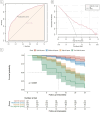Development and external validation of a prediction model for the risk of relapse in psoriasis after discontinuation of biologics
- PMID: 39659622
- PMCID: PMC11628277
- DOI: 10.3389/fmed.2024.1488096
Development and external validation of a prediction model for the risk of relapse in psoriasis after discontinuation of biologics
Abstract
Background: Some patients with psoriasis experience relapses shortly after discontinuation of biologics. However, there is a lack of risk prediction tools to identify those at high risk of relapse.
Objective: To develop and validate a risk prediction model for psoriasis relapse after biologics discontinuation.
Methods: Publications from PubMed, EMBASE, Medline, and the Cochrane Library were systematically searched and meta-analyses were conducted to identify risk factors for psoriasis relapse after biologics discontinuation. Statistically significant risk factors were identified and used to create a risk assessment model weighted by the impact of each factor. The model was externally validated using a cohort of 416 Chinese psoriasis patients.
Results: Eight studies (N = 2066) were included in the meta-analysis. Body mass index (BMI), smoking, disease duration, comorbid psoriatic arthritis (PsA), remission speed and extent during treatment, history of biologic therapy, and therapy duration were identified as correlates of relapse in the meta-analysis and were incorporated into the prediction model. The median age of the 416 patients in the validation cohort was 41.5 (IQR 32, 53) years, with 63% male, and a baseline PASI score of 15.4 (IQR 10.5, 21). It was verified that the area under the curve (AUC) of the prediction model was 0.796 (95% CI, 0.753-0.839), with an optimal cut-off value of 11.25 points, sensitivity of 65.1%, and specificity of 82.2%.
Conclusion: Multivariate models using available clinical parameters can predict relapse risk in psoriasis patients after biologics discontinuation. Early individual identification of patients at risk of relapse, and screening of candidate cohorts for long-term treatment or dose reduction may benefit both patients and physicians.
Keywords: biologics; prediction model; psoriasis; relapse; risk factor.
Copyright © 2024 Huang, Chen, Qi, Duan and Bai.
Conflict of interest statement
The authors declare that the research was conducted in the absence of any commercial or financial relationships that could be construed as a potential conflict of interest.
Figures


Similar articles
-
Predicting the Time to Relapse Following Withdrawal from Different Biologics in Patients with Psoriasis who Responded to Therapy: A 12-Year Multicenter Cohort Study.Am J Clin Dermatol. 2024 Nov;25(6):997-1008. doi: 10.1007/s40257-024-00887-8. Epub 2024 Sep 16. Am J Clin Dermatol. 2024. PMID: 39283586
-
Personalized prediction of psoriasis relapse post-biologic discontinuation: a machine learning-driven population cohort study.J Dermatolog Treat. 2025 Dec;36(1):2480743. doi: 10.1080/09546634.2025.2480743. Epub 2025 Mar 19. J Dermatolog Treat. 2025. PMID: 40107277
-
Adjunctive Chinese medicine therapy reduces relapse of psoriasis vulgaris after discontinuation of biologics: a prospective registry-based cohort study.J Dermatolog Treat. 2024 Dec;35(1):2355261. doi: 10.1080/09546634.2024.2355261. Epub 2024 May 20. J Dermatolog Treat. 2024. PMID: 38767401
-
Systemic pharmacological treatments for chronic plaque psoriasis: a network meta-analysis.Cochrane Database Syst Rev. 2023 Jul 12;7(7):CD011535. doi: 10.1002/14651858.CD011535.pub6. Cochrane Database Syst Rev. 2023. PMID: 37436070 Free PMC article. Review.
-
Dose Tapering of Biologics in Patients with Psoriasis: A Scoping Review.Drugs. 2021 Feb;81(3):349-366. doi: 10.1007/s40265-020-01448-z. Drugs. 2021. PMID: 33453052 Free PMC article.
Cited by
-
Tobacco Smoking Was Positively Associated with Disease Relapse at week 24 and 48 Among Patients with Psoriasis Vulgaris in Shanghai: A Prospective Study.Psoriasis (Auckl). 2025 Jul 14;15:261-272. doi: 10.2147/PTT.S534032. eCollection 2025. Psoriasis (Auckl). 2025. PMID: 40689155 Free PMC article.
References
LinkOut - more resources
Full Text Sources
Research Materials
Miscellaneous

